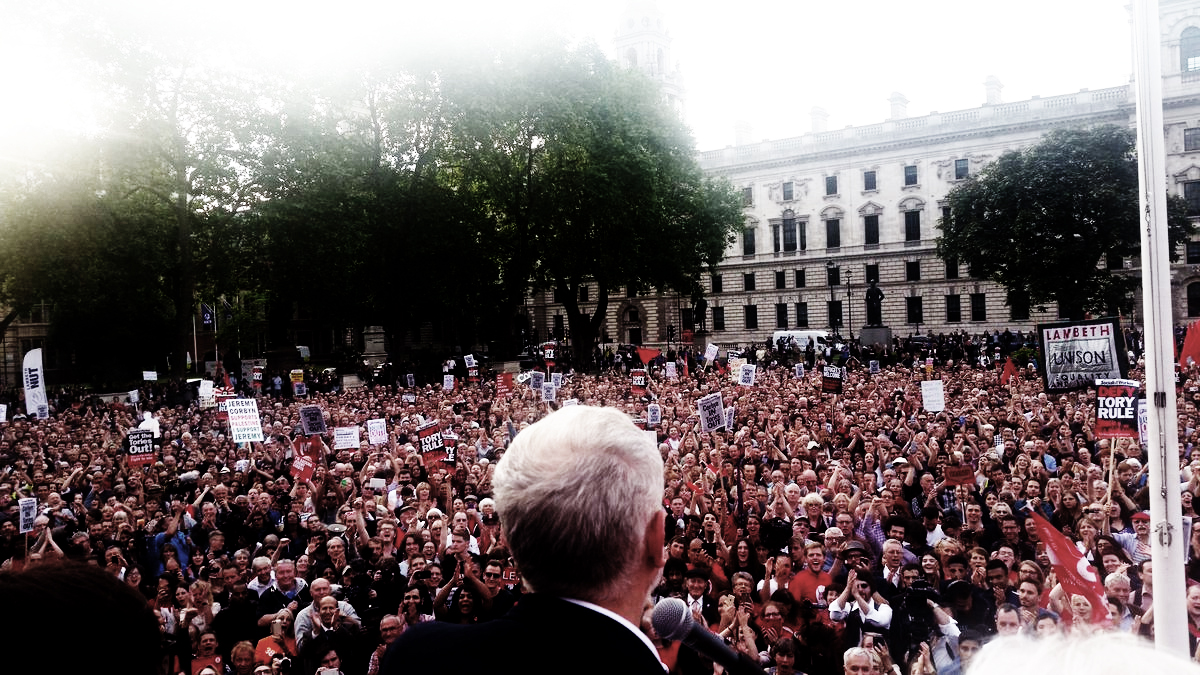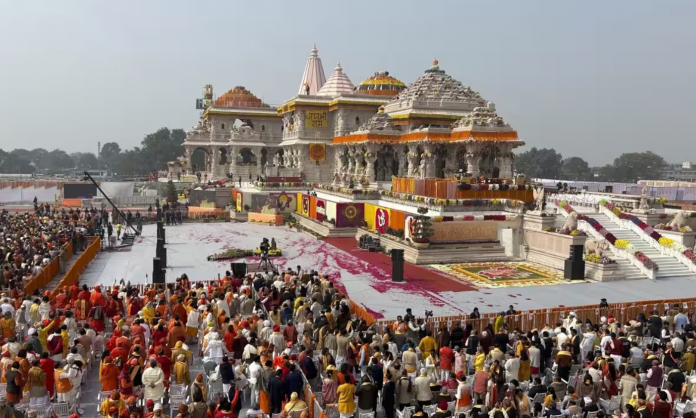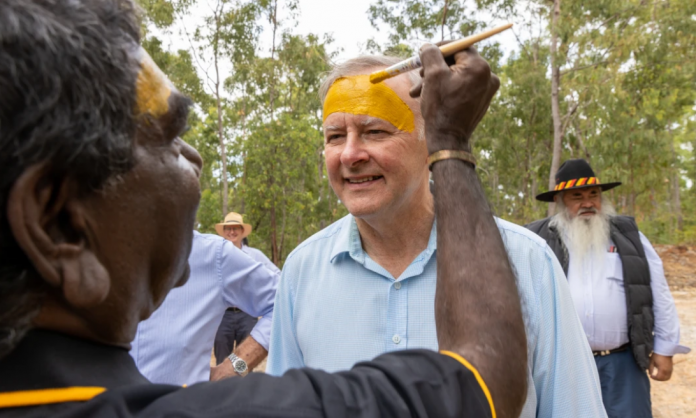Jeremy Corbyn has survived the first serious and coordinated assault on his leadership of the British Labour Party.
A manufactured moral panic around anti-Semitism has been the excuse for a public wrecking campaign and an attempted backroom coup against the left wing leader.
For weeks, the party has been consumed by a very public power struggle. Prominent leftists have had their membership suspended, as have rank and file activists. Ever more open threats of a leadership challenge against Corbyn have appeared in the media.
Multiple inquiries have been launched into the alleged cause of the crisis: the development of an anti-Semitic wing of the Labour Party, apparently emboldened by the leadership of the “extremist” Corbyn.
The barrage was remarkable for its intensity, duration and broad participation. At times, it seemed like all of British society was united in a desire to dislodge Corbyn – all, of course, because of their deep concern about anti-Semitism.
The whole menagerie of right wing British newspapers – the Sun, the Times, the Telegraph, even the formerly fascist Daily Mail – was campaigning to purge Labour of undesirables. But so were left liberal luminaries from the Guardian, in which Jonathan Freedland declared “Labour and the left have an anti-Semitism problem”.
The Conservative Party sank the boot in, from prime minister David Cameron to Zac Goldsmith, the failed Tory candidate for mayor of London, who implied that a Labour victory in London could lead to Jew-killing terrorists taking control of the city.
But Labour politicians were just as keen to take part, if not more so. They openly collaborated with their supposed enemies – the deeply racist Conservative government and the Corbyn-hating right wing media – to create a storm of controversy that would weaken Corbyn’s authority and allow them to launch a coup.
They did it, not because Corbyn’s left wing leadership is unpopular, but precisely because his popularity is putting their influence under strain.

When Corbyn was elected leader of British Labour, it was a catastrophe for the neoliberal Blairite wing of the party. Corbyn won a landslide 60 percent of the vote, giving him an overwhelming mandate to shift the party dramatically to the left. More than 100,000 new members signed up to the party, and tens of thousands signed up to Momentum, the Corbyn supporters’ group.
The Blairites bore responsibility for the long term decline of the party. Their support for right wing economic policies and imperialist wars meant that workers no longer viewed the party as their party, and young people no longer saw in it any hope for the future: between 1997 and 2010, 5 million voters deserted Labour, cutting its support in half.
Tony Blair’s “New Labour”, in keeping with its image as the truly modern right wing party, was a staunch supporter of Israel’s racist regime of occupation, ethnic cleansing and apartheid. Throughout the years of dispossession, bombardment, torture and expulsion of Palestine’s indigenous Arab population, Blairite Labour was always a “true friend of Israel” (in the words of Israeli ex-PM Ehud Olmert).
Contempt for the rights of Palestinians was just one measure of the indifference of British Labour to any pretence of fighting for justice, even for those who suffered some of the most extreme racist brutality in the modern global order.
But in 2015, Corbyn’s candidacy promised to restore Labour’s troubled relationship with the exploited and oppressed. The Blairite apparatus moved quickly to smother it. Tens of thousands of applicants, including famous leftist film-maker Ken Loach and the prominent left union official Mark Serwotka, were banned from voting, in a transparent attempt to rig the leadership election.
But it was to no avail. Corbyn won. The candidacies of supposedly invulnerable Blairite apparatchiks were drowned under a wave of enthusiasm for a left wing challenge to the existing political consensus.
Corbyn’s right wing enemies warned that the leadership of an old-school leftist, with a long history of anti-rich and anti-imperialist campaigning, would lead the party to electoral disaster.
But they were to be disappointed. Corbyn has gone from strength to strength. In the first test of the new leadership, a by-election in December last year, Corbyn’s Labour romped to victory with a 7.3 percent increase in its vote.
Weeks after his victory, he secured a narrow majority on Labour’s national executive, and in February his supporters won overwhelming victories in leadership elections for the Labour Party’s youth wing. In March, polls showed Corbyn’s “unelectable” Labour drawing even with the Tories, then overtaking them.
Cameron’s Conservatives found themselves stumbling from one disaster to another. Their austerity budget faced resistance. Junior doctors organised a rare strike, which won enormous popular support. Cameron’s own welfare secretary resigned, disgraced by budgetary measures that had led to a wave of suicides and a massive increase in mental illness. In April, Cameron himself was implicated as beneficiary of a secret offshore trust revealed in the Panama Papers, leading to protests calling for his resignation.
Squeezed in the middle of this Tory turmoil were roughly 200 right wing Labour MPs. In the face of proof that in this era of austerity, Corbynism has significant appeal, New Labour appeared historically obsolete. A circuit breaker was needed. The 5 May local elections provided the opportunity. A success for Labour would mean a further strengthening of Corbyn’s hand. An electoral wipeout would provide an opportunity for a leadership challenge, and a way to drag the party back to the right.
It began, as with so many sordid right wing hatchet-jobs, in student politics.
To discredit the Momentum-endorsed candidate for the upcoming Labour national executive committee (NEC) elections, Blairite students alleged that the Oxford University Labour Club had been overrun by anti-Semites.
At the core of the claim was an allegation that Labour students supported “Israeli Apartheid Week” – that is, that they supported anti-racist activism. To smear such activity as anti-Semitism is, sadly, routine, and should be considered an absolute outrage by any serious opponent of racism.
The trick worked. Momentum’s candidate, implicated in the “scandal”, lost the NEC election by 1 percent of the vote. The media picked up the story and ran with it. An internal inquiry was launched in February.
The British media spent the three months between then and the local elections digging up everything they could find. Old Facebook posts by unknown Labour councillors, unsourced rumours, use of the term “Zionist” – everything was grist to the mill of a totally concocted narrative that Corbyn’s leadership had brought an influx of Jew-hating extremists into the Labour Party.
Dozens of members, including members of parliament, were suspended from the party. Almost every day brought a new story about the “anti-Semitism crisis”, the “civil war” that was “engulfing” Labour.
In almost all cases, the “anti-Semitism” amounted to nothing but opposition to Israeli racism. Stupid remarks, like left stalwart Ken Livingstone’s claim that Hitler was a Zionist, were far from helpful, but they in no way implied a racial or religious prejudice against Jews.
A few isolated instances of prejudiced remarks appear to have been unearthed. But they pale in comparison to the monstrous barrage of Islamophobia that coincided with the campaign.
The hypocrisy is staggering. British Muslims are routinely harassed by police and intelligence services. Far right parties beat Muslims in the streets and openly call for their full-scale deportation. Tony Blair himself claims that support for ISIS has “deep roots” in Muslim society. Conservatives – as part of the very same scare campaign about Labour – claim that the election of a Muslim in London will lead to new terror attacks (because terrorist sympathisers will take control of the Metropolitan Police!).
Yet there is no talk of a “crisis” of Islamophobia. No expulsions or suspensions from Labour or the Tories are proposed. There are no calls for newspaper editors to be sacked. These deeply racist institutions support each other wholeheartedly in their shared project to further the oppression of Muslims.
The most deplorable role in this witch-hunt has been played by sitting right wing Labour MPs such as John Mann, who staged a made-for-TV confrontation with Livingstone, in full view of as many cameras as he could find.
Or Chris Bryant, the Blairite MP, previously famous for claiming £92,000 in parliamentary expenses, who wrote in the Times that Labour could not criticise the apartheid nature of the Israeli state. Any toleration of anti-Zionism, he said, would constitute a “not-too-subtle form of anti-Semitism”.
Progress, the Blairite factional organisation, published an eight-point blueprint for dealing with the crisis, which included forbidding within the party any criticism of Zionism.
Shamefully, much of the Jewish establishment played along. Jewish organisations such as the Board of Deputies, long controlled by political supporters of Israel and strongly connected to the Labour Party right, dutifully issued statements expressing their concern about this purported new anti-Semitism.
Ephraim Mirvis, Britain’s chief rabbi, used his tremendous moral authority to claim in the Telegraph that any opposition to Zionism is inherently anti-Semitic, a claim that should cause absolute outrage in any Jew who does not wish to be defined by the brutality of Israel.
It is abominable that these Jewish institutions lined up with the ex-fascist Daily Mail, with the Conservative Party whose members called for Nelson Mandela to be hanged, and with the Blairites who rained bombs on Iraq.
On the other hand, it is to the great credit of Jewish groups and activists like Independent Jewish Voices (IJV) and long term Labour activist Mark Bash that they issued excellent statements in the midst of the crisis. As IJV put it: “The current climate is quickly coming to resemble a witch-hunt … we urge people of conscience not to succumb to this campaign of intimidation”.
Courageous Jewish voices such as these must be supported and strengthened.
By the time of the 5 May elections, the Labour right and its enablers were practically high-fiving each other. They could barely contain their glee. “Dead man walking”, read the headline in the Daily Mail, predicting a loss of more than 200 local seats for Corbyn’s Labour. The Mail quoted plans from Blairite MPs to launch a “media blitz” in preparation for a coup immediately after the elections. A candidate to launch the challenge was named.
There was only one problem – Corbyn’s support proved much more resilient than predicted. Despite the massive, extended and coordinated assault on his leadership – and the eager efforts by those in his own party to claim that Corbyn’s Labour was a haven for racist extremists – his hard-hitting anti-austerity politics remains popular.
The hoped-for disaster, prelude to a leadership challenge, did not materialise. Labour did not lose 200 seats. It lost 18; the Tories lost 47. As John Mann conceded on election night, a leadership challenge “ain’t gonna happen”.
Corbyn’s response to the challenge was not perfect. Even given the extremely difficult position he was put in, he sometimes conceded too much ground, and did not make clear that anti-Zionism is actually an expression of the very principled opposition to racism that he has demonstrated his entire life.
But despite the vicious backlash he has endured, he has made it clear that anti-imperialist politics and opposition to Cameron’s austerity drive have a place in the Labour Party – for now at least. And that continues to win him the support and admiration of many hundreds of thousands.
This failed coup shows both the hypocrisy and the power of anti-Semitism accusations, which are more and more frequently the weapon of first resort against the left.
The British right wing media and the Conservative Party share an odious history: flirtations with fascism and Jew-baiting; open contempt for Britain’s Black population; steadfast support for the murderous apartheid regime in South Africa, all the way to the bitter end. And now they regularly incite hatred and fear of Muslims and migrants.
Their claims to be concerned about racial or religious prejudice should be dismissed. But they cannot be ignored. The left must be prepared for this assault, understand it as an excuse for a witch-hunt and defend itself and its record vigorously. We can’t give in to the myth that it is us, rather than the Camerons and Blairs of the world, who have a problem with racism.
The saga also demonstrates the breathtaking cynicism of the right wing bureaucrats who long controlled the British Labour Party. They defend their repulsive, pro-imperialist, neoliberal politics by saying that “loony left” politics will make their parties unelectable.
But this episode has revealed their willingness to savage their own organisation, wreck its reputation and collaborate with the Tories to sabotage the prospects of an election victory. Loyal servants of the ruling class, they would rather the Labour Party lose elections than shift to the left.
Similar dynamics have consumed similar parties elsewhere: in Greece, the leadership of PASOK took its once formidable party into electoral oblivion, rather than stand up to austerity.
Corbyn’s battles with this group are far from over. Even Sadiq Khan, who ultimately defeated the racist fear campaign to win the race for London mayor, has used this position to immediately attack Corbyn’s leadership.
In the long run, Corbyn cannot serve as leader of hundreds of right wing parliamentarians. If he retains his principles, sooner or later, either he must go or his enemies must.
Daniel Taylor is a member of Jews Against Israeli Apartheid.









